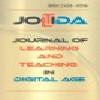Examining Pre-Service Physical Education Teachers’ Departmental Satisfaction and Academic Performance: Vocational Personality Approach
Examining Pre-Service Physical Education Teachers’ Departmental Satisfaction and Academic Performance: Vocational Personality Approach
Physical Education, vocational choice, holland’s theory personality, departmental satisfaction,
___
- Akçamete, G, Koner, S. ve Sucuoğlu, B. (2001). Öğretmenlerde Tükenmişlik, İş Doyumu ve Kişilik. Ankara: Nobel Yayınları.
- Aydoğan, H. (2006).Beden Eğitimi Öğretmenlerinin Meslekte Karşılaştıkları Sorunlar, Yüksek Lisans Tezi, Gazi Üniversitesi, Eğitim Bilimleri Enstitüsü, Ankara.
- Berghe, L.V., Cardon, G. M., Aelterman, N., Tallir, I.B., Bansteenkiste, M.,& Haerens, L. (2013). Emotional xhaustion and motivation in physical education teachers: A variable-centered and person-centered approach. Journal of Teaching in Physical Education, 32(3), 305-320.
- Cevik, B., Perkmen, S., Alkan, M., & Shelley, M. (2013). Who should study music education? A vocational personality approach. Music Education Research, DOI:10.1080/14613808.2013.788140
- Demirel, Ö. (2008). Öğretim ilke ve yöntemleri: Öğretme sanatı. Ankara: Pegem Yayıncılık.
- Fejgin, N., Ephraty, N., & Ben-Sira, D. (1995). Work environment and burnout of physical education teachers. Journal of Teaching in Physical Education, 15(1), 64-78.
- Fejgin, N., Talmor, R.,& Erlich, I. (2005). Inclusion and burnout in physical education. European Physical Education Review,11(1), 29-50.
- Holland, J. L. (1994). Self-directed search form R.(4th ed). Odessa, FL: Psychological Assessment Resources.
- Holland J. L. (1997). Making vocational choices: A theory of careers (3rd ed.). Odessa, FL: Psychological Assessment Resources, Inc..
- Koustelios, A., Theodorakis, D. & Goulimaris, D. (2004). Role ambiguity, role conflict and job satisfaction among physical education teachers in Greece. International Journal of Educational Management, 18(2), 87-92.
- Koustelios, A., & Tsigilis, N. (2005). The relationship between burnout and job satisfaction among physical education teachers: a multivariate approach. European Physical Education Review, 11(2), 189-203.
- Kunin, T. (1955). The construction of a new type of attitude measure. Personnel Psychology 8, 65-77.
- Özsaker, M., & Orhun, A, (2005). İlköğretim Okullarında Beden Eğitimi Dersinin Amaç ve İçeriğine İlişkin Sorunlar. 4.Ulusal Beden Eğitimi ve Spor Öğretmenliği Sempozyumu, Uludağ Üniversitesi, Bursa. Pehlivan, Z. (1992). Ders Dışı Spor Faaliyetlerinde Beden Eğitimi Öğretmenlerinin Yeri ve Önemi. 1. Eğitim Kurumlarında Beden Eğitimi ve Spor Sempozyumu, Milli Eğitim Publications, Ankara.
- Perkmen S. (2012). Testing the utility of person-environment correspondence theory with instructional technology students in Turkey. Australian Journal of CareerDevelopment, 21(2), 25-35.
- Perkmen, S. & Sahin, S. (2013). Who should study instructional technology? Vocational personality approach, British Journal of Educational Technology, 44(1), 54-65.
- Perkmen, S., Cevik, B. & Alkan, M. (2012). Pre-service music teachers vocational satisfaction: person-environment fit approach, British Journal of Music Education, 29(3), 371-385.
- Sevimli, D. Çam, S., Dinç, Z., Dikici, K., & Durusoy, E. A. (2010). Beden eğitimi ve spor yüksekokulu özelyetenek sınavını kazanan öğrencilerin ÖSS puanlarının genel başarılarına etkisinin incelenmesi, Journal of New World Sciences Academy. 5(4), 319-327.
- Swanson, J. L. & Fouad, N.A. (1999). Career theory and practice. Learning through case studies. London, UK: Sage Publications.
- Öncü, E. & Güven, Ö. (2011). Ana-babaların çocuklarının beden eğitimi dersine katılımına yönelik tutumları. Spor ve Performans Dergisi, 2(2), 28-27.
- Tamer, K., & Pulur, A. (2001). Beden eğitimi ve sporda öğretim yöntemleri. Ankara: Ada Yayıncılık.
- Ulucan, H., Türkçağar, Ü., & Bekir, B. C. (2012). Beden eğitimi öğretmenlerinin meslekte karşılaştıkları sorunların incelenmesi: Kırşehir ili uygulaması. Ahi Evran Üniversitesi Kırşehir Eğitim Fakültesi Dergisi, 13(2),265-277.
- Yavaş, M. & İlhan, A. (1997). Beden eğitimi ve sporda özel öğretim yöntemleri. Bursa: Melisa Yayıncılık.
- Uğur O.A (2006) Beden Eğitimi Öğretmenlerinin Sınıf Yönetimi Yaklaşımı Ve Karşılaştıkları Sorunlar Üzerine Bir Araştırma. Yayınlanmamış Yüksek Lisans Tezi. Eğitim Bilimleri Enstitüsü, Gazi Üniversitesi, Ankara.
- Cynx, J., Williams, H., & Nottebohm, F. (1992). Hemispheric differences in avian song discrimination. Proceedings of the National Academy of Sciences, 89, 1372- 1375.
- McDonald, J. T. (2002, Ocak). Using problem based learning a in science methods course. Paper presented at the Annual Meeting of the Association for the Education of Teachers in Science, Charlotte, USA.
- Mead, J. V. (1992). Looking at old photographs: Investigating the teacher tales that novice teachers bring with them (Report No. NCRTL-RR-92-4). East Lansing, MI: National Center for Research on Teacher Learning. (ERIC Document Reproduction Service No. ED346082)
- Borman, W. C., Hanson, M. A., Oppler, S. H., Pulakos, E. D., & White, L. A. (1993). Role of early supervisory experience in supervisor performance. Journal of Applied Psychology, 78, 443-449. Retrieved October 23, 2000, from PsycARTICLES database.
- Fournier, M., de Ridder, D., & Bensing, J. (1999). Optimism and adaptation to multiple sclerosis:What does optimism mean? Journal of Behavioral Medicine, 22, 303-326. Abstract retrieved October 23, 2000, from PsycINFO database.
- Yayın Aralığı: 2
- Başlangıç: 2016
- Yayıncı: Mehmet Akif Ocak
Comparative Effectiveness Research and Its Application to Nursing Education
Claire Su-yeon PARK, Eunok PARK, Mehmet Akif OCAK
Serkan PERKMEN, Ahmet Haktan SİVRİKAYA
Determination of Cyber Security Awareness of Public Employees and Consciousness-rising Suggestions
Huseyin KURU, Mehmet Akif OCAK
Discipline or Classroom Management
Ozcan DEMİR, Ahmet ATAN, Yücel GELİSLİ
